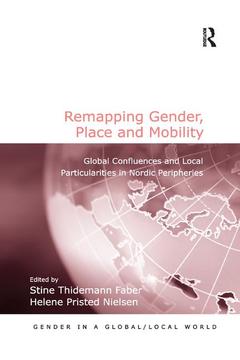Remapping Gender, Place and Mobility Global Confluences and Local Particularities in Nordic Peripheries Gender in a Global/Local World Series
Coordonnateurs : Faber Stine Thidemann, Nielsen Helene Pristed

Date de parution : 10-2017
15.6x23.4 cm
Date de parution : 06-2015
15.6x23.4 cm
Thème de Remapping Gender, Place and Mobility :
Mots-clés :
Young Men; Aina Tollefsen; EU Civilian Crisis Management; Anja Kirkeby; CSME; Ann-Dorte Christensen; Vice Versa; Birte Siim; Social Democratic Welfare State Regime; Carla Freeman; Welfare Nationalism; Claus D; Hansen; North Denmark; Elina Penttinen; Aalborg East; Gestur Hovgaard; Swedish Migration Board; Gry Paulgaard; Nordic Periphery; Helene Pristed Nielsen; Atomistic World View; Lotte Bloksgaard; Lifestyle Migrants; Madeleine Eriksson; Place Attachment; Mai Camilla Munkejord; Helsingborgs Dagblad; Pauline Stoltz; Universal Social Rights; Ruth Emerek; Unnur DSkaptad?Ttir; Berry Pickers; Supply Chain Capitalism; International Crisis Management; Rotten Banana; Immigrant Entrepreneurs; Immigrant Entrepreneurship; Gender Equality; Nordic Approach; Phoenix Enterprise



